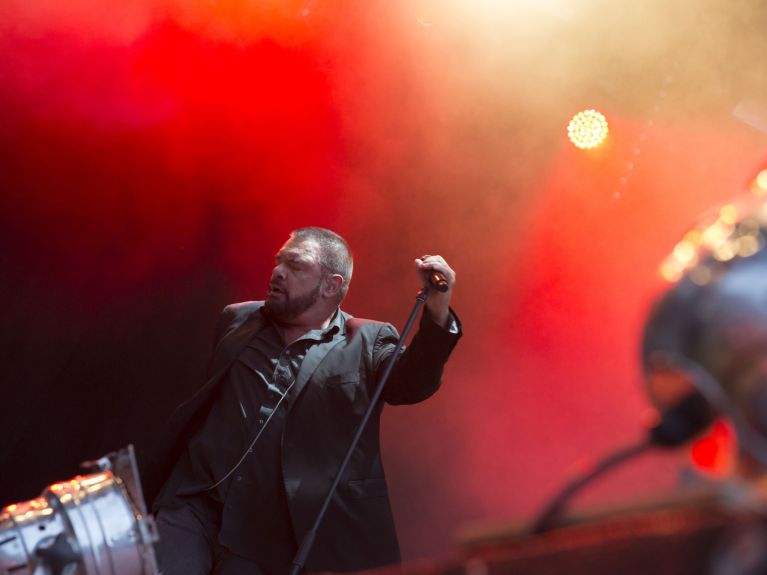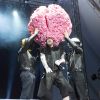10 Great Bands You Didn’t Know Were German
Without further ado, here are 10 bands that you (probably) didn’t know were German.

Mention German music and certain musicians might come to mind, be it classical composers like Beethoven and Bach on one end of the spectrum, or hard rock and industrial names like Rammstein on the other. But within the hundreds of years that span between these two musical extremes are countless German artists, a handful of which have gone on to achieve relative success outside of their home country. Without further ado, here are 10 bands that you (probably) didn’t know were German. And no, David Hasselhoff doesn’t count.
Alphaville
Though a lot of German bands have been divided in their success, either achieving fame in their home country or on an international stage, Alphaville remains one of those bands that topped charts around the world. Formed in Münster in 1982, the new wave band got its start at the same time that the Neue Deutsche Welle movement was taking over Germany. However, Alphaville resisted German lyrics and sang instead in English, which is one reason their sound spread beyond the borders of West Germany. Debut album “Forever Young” came out in 1984 and had a handful of successful singles, including its title track and “Big in Japan.” Though an additional five albums followed, the band arguably was never as famous as in the first few years of its existence.
Listen to Alphaville:
Atari Teenage Riot
Digital hardcore pioneers Atari Teenage Riot (ATR) formed in Berlin in 1992 and quickly became known for their unique fusion of hardcore and techno music. The original trio consisted of Germans Alec Empire and Hanin Elias, and Swazi-born Berlin-based MC Carl Crack, who has died in 2001. In 1996, Japanese-German-American Nic Endo joined ATR. Hanin Elias left the group in 2000. One of the group’s more famous incidents was an outdoor performance on May Day 1999 in Berlin’s Kreuzberg district, wherein the members were arrested for inciting violence that resulted in a riot with the local police. In 2000, the band called it quits, but 10 years later, ATR reformed with Empire and Endo, adding two more members to the lineup. The band is still radically left wing, writing politically fueled songs that are as dissonant, noisy, and emotionally charged as they’ve always been.
Listen to Atari Teenage Riot:
Digitalism
You wouldn’t be blamed for thinking that Digitalism were French; the electronic music duo not only shares some similarities with French house group Daft Punk but was also signed with Parisian music and fashion label Kitsuné. In actuality, however, Digitalism was formed in 2004 in Hamburg by Jens Moelle and İsmail Tüfekçi, after the two met at a record store. The band’s particular brand of electro house dance-punk is lively and energetic, with plenty of gear (keyboards, sequencers, MIDI controllers, drum machines, synthesizers, laptops) combined to achieve their vibrant signature style. Two albums, a handful of EPs, and dozens of remixes have cemented Digitalism as one of the top groups in their genre.
Listen to Digitalism:
Milli Vanilli
New jack swing is a genre name that might have you scratching your head, but Color Me Badd, Keith Sweat, Paula Abdul, New Kids on the Block, MC Hammer, and even Janet Jackson have all incorporated this sound into their music, particularly in the late ‘80s. Another classic example of new jack swing is the shortlived R&B dance duo Milli Vanilli. The title track from their 1989 debut album, “Girl You Know It’s True” was number one on the Billboard Top 200 for eight weeks, and in 1990, Milli Vanilla won a Grammy for Best New Artist.
Formed in Munich and consisting of members Rob Pilatus (German) and Fab Morvan (French), the duo actually had five total tracks appear on the Billboard Hot 100, but by 1990, their 15 minutes of fame were up when news broke that they had not recorded the lead vocals on the album. Instead, they continued for a short while as a duo, Rob & Fab, but never achieved the same level of success as Milli Vanilli.
Listen to Milli Vanilli:
Mouse on Mars
IDM, or intelligent dance music, first hit the scene in the early ‘90s, the same time as Düsseldorf electronic music duo Mouse on Mars came into being. Members Andi Toma and Jan St. Werner play music that is a little bit glitchy, a little bit ambient, a little bit industrial, and a little bit trancey. Though many electronic musicians today rely solely on digital instrumentation and programmed beats, Mouse on Mars have a distinctly analog side to them, which includes live instruments during performances and songs recorded and performed on self-created software.
Listen to Mouse on Mars:
The Notwist
One of the standout bands on the indie rock circuit is the Notwist, which formed in the Bavarian town of Weilheim in Oberbayern in 1989. A few years of experimenting with hardcore and post-rock passed before the band settled on its current sound, a mixture of indie rock and electronica. In 2002, the group released its fifth studio album, “Neon Golden,” which won over American fans with its layers of smooth, glitchy beats and minimal guitar textures. Members of the Notwist are involved in additional projects that have also achieved varying levels of popularity outside of Germany. In 2003, they joined with Californian artists Themselves to form 13 & God, an indie hip hop side project. The band’s programmer, Martin Gretschmann, has also been releasing music as solo electronic musician Console since 1996.
Listen to The Notwist:
Pantha Du Prince
Pantha Du Prince is the stage name of Hendrik Weber, one of the top minimalist techno artists today. Born in the town of Bad Wildungen, Weber started making music under the Pantha Du Prince moniker in 2002, and has become well known for his particular brand of house music, which consists of field recordings, layered shoegazey synths, acoustic sounds, and percussive meanderings. Eschewing traditional house music structures that build and grow, eventually exploding at the apex, Weber’s songs are lush and chill aural soundscapes that wander along and bleed into one another flawlessly.
Listen to Pantha Du Prince:
The Scorpions
If you grew up in the ‘80s, if you’re an avid “Guitar Hero” fan, or if you’re a regular on the karaoke circuit, then you’ve likely heard “Rock You Like a Hurricane” more times than you can count. But what you might not realize is that the Scorpions originate from Hannover. Founded in 1965 in what was then West Germany, the group is still active today, churning out solid metal tracks and pop-infused rock ballads on the regular. But even though the band has released 18 studio albums, their six albums that came out between 1978 and 1991 were considered their best work. This stretch of time also gave birth to the single “Wind of Change,” which sold more than 14 million copies, placing it in the top 15 best-selling singles of all time.
Listen to The Scorpions:
Tangerine Dream
Unless Krautrock is your thing, it isn’t immediately obvious that Tangerine Dream is a German band. Formed in West Berlin in 1967 by Edgar Froese, referring to the band as prolific might just be an understatement; over a span of nearly five decades, the group has released more than 100 albums. Naturally it follows that the music hasn’t stayed the same, with different periods in time giving way to changing influences and sound. The band’s psychedelic and Krautrock beginnings evolved to include jazz, classical, house, progressive rock, drum and bass, instrumental, and new age sounds. Over the course of Tangerine Dream’s 25 different lineups, Froese has been the one consistent factor, though his death in early 2015 put the band on hold until the remaining members made the decision to continue on, working toward accomplishing his vision and honoring his legacy.
Listen to Tangerine Dream:
The Whitest Boy Alive
Because the group was fronted by Kings of Convenience member Erlend Øye, a lot of people simply assumed the Whitest Boy Alive was a Norwegian project. However, the quartet not only joined forces in Berlin in 2003, but also consisted of German members. An electronic dance band, the Whitest Boy Alive was known for its rhythmic minimalist pop sound with smooth vocals, tight song structures, funk-inspired backbeats, and indie rock guitars. After two albums, which came out in 2006 and 2009, the group called in quits in 2014.
Listen to The Whitest Boy Alive:
Didn't see your favorite German band on the list? Stop by the Deutschland.de facebook page and tell us who we should be listening to.
